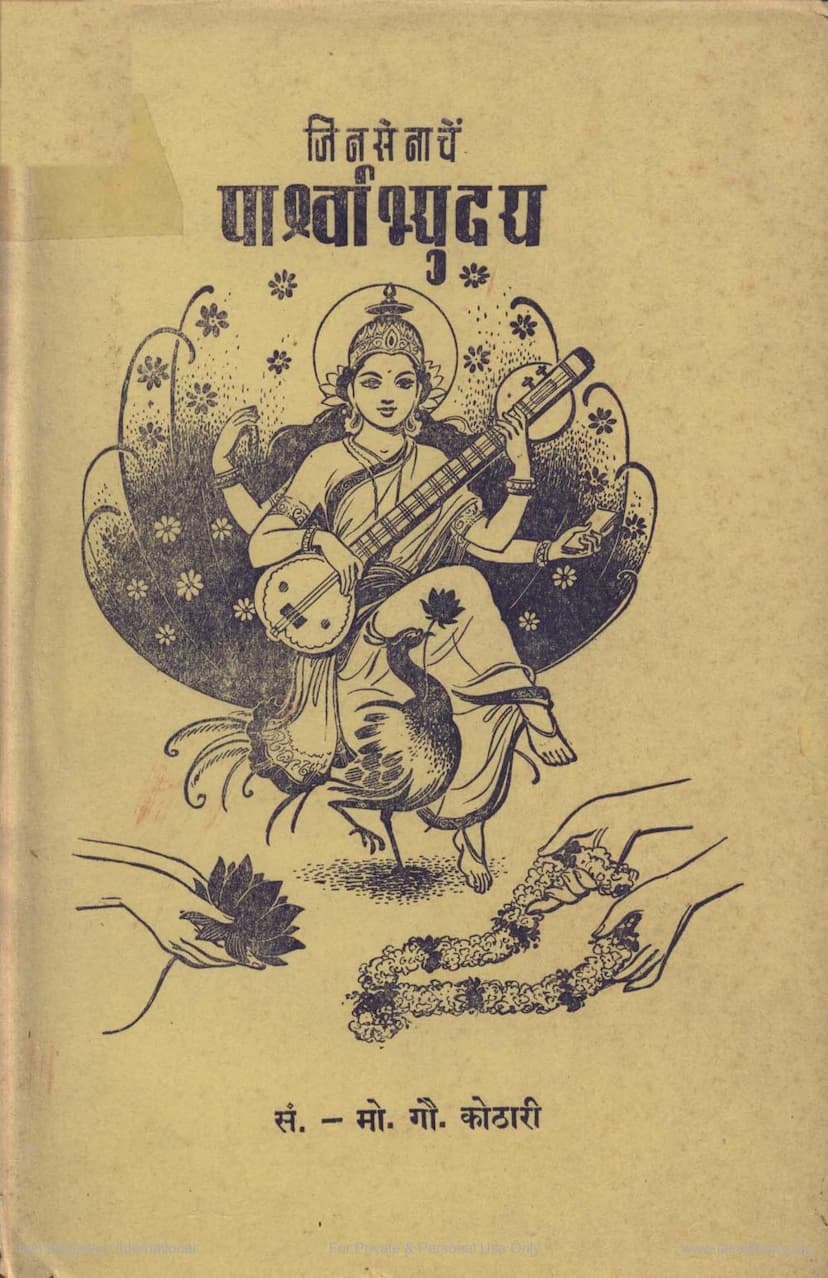Parshvabhyuday
Added to library: September 2, 2025

Summary
Parshvabhyuday: A Comprehensive Summary
Parshvabhyuday, authored by Acharya Jinsenacharya and edited by M. G. Kothari, is a significant Jain text published by Gulabchand Hirachand Doshi. The catalog link provided (https://jainqq.org/explore/001704/1) suggests a scholarly edition with detailed explanations and context.
Content and Structure:
The text is a poetic work dedicated to Lord Parshvanatha, the 23rd Tirthankara, and recounts his life and spiritual journey. The preface by M. G. Kothari highlights the meticulous approach taken in preparing this edition, including:
- Detailed Construction: Each stanza is accompanied by its grammatical construction.
- Sanskrit Commentary: A commentary in Sanskrit by the editor is provided below the construction.
- English Translation: A translation of each stanza into English follows.
- Explanatory Notes: Exhaustive explanatory notes in English are given at the end.
- Meghaduta Text: The portions of Meghaduta by Kalidasa found within Parshvabhyuday are separately printed with variants.
- Historical Context: The introduction attempts to fix the date of Acharya Jinasena using internal and external evidence, corroborating it with the Sanjana copper-plate inscription from 793 of the Shaliivahana Saka era.
Key Themes and Arguments:
- Dating of Acharya Jinasena: A significant portion of the introduction is dedicated to establishing the chronological placement of Acharya Jinasena. The editor engages with various scholarly opinions and presents his own arguments based on references to historical figures like King Krsnaraja, King Vallabha, King Indrayudha, King Vatsaraja, and the poet Pushpadanta. The editor argues for pushing back the dates of Pushpadanta, Bharata, Nanna, King Krsparaja alias Akalavarsha, Acharya Gunabhadra, and his preceptor Acharya Jinasena to a period prior to the year 705 of the Shaliivahana Saka era.
- The Parshvabhyudaya's Significance: The editor contends that Parshvabhyudaya is likely the last work of Acharya Jinasena. The work is praised for its vivid imagination, scholarly depth, and masterful use of poetic sentiments and figures of speech. The text is noted for incorporating lines from Kalidasa's Meghaduta, demonstrating a unique blend of literary styles.
- Jinasena's Scholarship: The introduction delves into Jinasena's profound knowledge across various branches of learning, including logic, philosophy, language, poesy, Karma-philosophy, theosophy, and grammar. His mastery of grammar is particularly highlighted with examples of complex grammatical forms found in his works.
- Jinasena as a Poet: Jinasena's poetical prowess is lauded for his vivid imagination, masterful expression of poetic sentiments, and employment of figures of speech. His definition of poetry differs from other rhetoricians, emphasizing charm and delight for the reader.
- Jinasena's Philosophical and Karmic Expertise: The text showcases Jinasena's strong adherence to the Jain theory of Non-Absolution (Anekantavada) and his deep understanding of moral philosophy and Karma-philosophy.
- Critique of the Meghaduta: While praising Kalidasa's Meghaduta, the editor also points out its limitations in size and plot, while highlighting its poetic charm and vivid imagery. The Parshvabhyudaya is presented as surpassing Meghaduta in its imaginative scope.
- The Story of Parshvanatha: The poem details the incidents from Parshvanatha's previous birth, where he was known as Marubhuti, and his younger brother was Kamath. It describes the conflict between them, Sambarosura's (Kamatha's later form) actions to harass Parshvanatha, and the eventual triumph of virtue. The narrative artfully depicts the emotions and reactions of the characters, including Sambara's attempts to provoke Parshvanatha, the sage's unwavering composure, and the mythological elements woven into the story.
- Identification of Kings and Chronology: The introduction provides a comparative study of copper-plate inscriptions to establish the genealogy of the Rashtrakuta dynasty and reconcile differing historical accounts.
Overall Impression:
Parshvabhyuday, as presented in this edition, is a multifaceted work that not only narrates the life of Lord Parshvanatha but also offers a deep dive into the life and times of Acharya Jinasena. The editor's dedication to providing a comprehensive and scholarly presentation makes this text valuable for anyone interested in Jain literature, Indian poetics, history, and philosophy. The detailed notes and translations aim to make the complex text accessible to a wider audience, appreciating the charm and imagination of the great poet Acharya Jinasena.